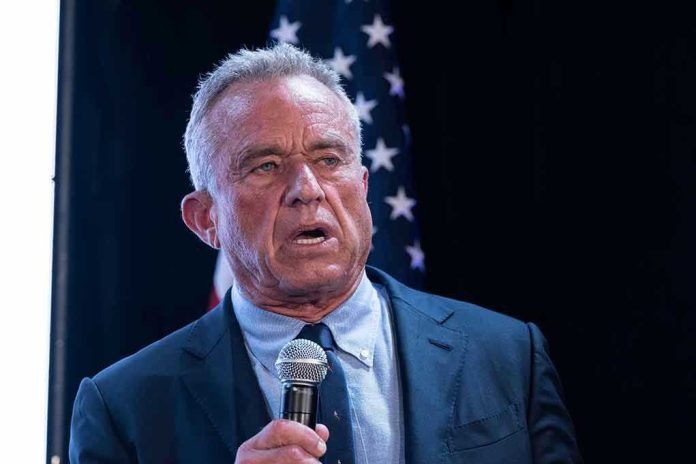
The nation’s top health official claimed American teenagers now have only half the sperm and testosterone of 65-year-old men—an assertion so jarring it detonated a firestorm of scientific and political debate, and left the public wondering: Is male fertility really under siege, or are we being sold a crisis built on sand?
Story Snapshot
- RFK Jr. asserted teens have 50% the sperm count and testosterone of 65-year-old men, contradicting well-established biology.
- Medical experts and reproductive scientists immediately challenged the claim as biologically implausible and unsupported by available data.
- The controversy spotlighted deeper anxieties about declining birth rates, masculinity, and the politicization of public health messaging.
- Experts warn that high-profile misinformation could erode trust in government health policy and misdirect serious research and resources.
RFK Jr. Takes the Podium: A High-Stakes Health Claim
October 16, 2025. The Oval Office. With President Trump seated nearby, Health and Human Services Secretary Robert F. Kennedy Jr. delivered an alarming warning: “Today, the average teenager in this country has 50 percent of the sperm count, 50 percent of the testosterone as a 65-year-old man.” The occasion was a White House event rolling out a new initiative for affordable fertility drugs, but Kennedy’s remarks instantly overshadowed the policy announcement. He called declining fertility rates a “national security threat” and fingered environmental chemicals as the culprit, weaving his warning into the administration’s MAHA—Make America Healthy Again—agenda.
Media outlets and social platforms lit up within hours. Many Americans, already attuned to headlines about plunging birth rates and debates over masculinity, found Kennedy’s statement both riveting and suspect. Some saw a leader sounding an overdue alarm; others saw a wild exaggeration, even a “pervy” misstep that risked making legitimate health concerns into the butt of online jokes.
Scientific Reality Check: What the Data Actually Show
Expert reaction was swift and, for the most part, merciless. Dr. Scott Lundy, a reproductive urologist at the Cleveland Clinic, summed up the consensus: Sperm counts and testosterone levels naturally peak in late adolescence and early adulthood, declining steadily with age. By all accepted science, a healthy 17-year-old should have much higher testosterone and sperm production than a man in his late sixties. Kennedy’s claim, scientists noted, flips biology upside down and is “biologically implausible.”
The real crux: No robust data even exist on teenage sperm counts. Semen analysis is rarely performed on minors, making credible historical comparisons impossible. While some studies hint at modest declines in adult sperm counts over decades, experts are deeply divided—some research triggers alarm, while others find no significant trend. Even among those who worry about sperm counts, no published research supports Kennedy’s assertion about teenagers specifically.
Cultural Anxiety and Political Messaging: Fertility in the Spotlight
Kennedy’s statement struck a chord because it played directly into national anxieties. Fears about declining birth rates, masculinity, and chemical exposures have migrated from academic journals to social media feeds and political stump speeches. The topic is hot: “Semen retention” was the most-viewed men’s health issue on TikTok and Instagram in 2022. Elon Musk, among others, has warned of civilization collapse if birth rates keep falling. By framing the fertility issue as an urgent crisis—one rooted in environmental chemicals—Kennedy sought to steer the policy conversation, but risked fueling panic over evidence-based debate.
RFK Jr: "Today the average teenager in this country has 50% of the sperm count, 50% of the testosterone of a 65 year old man. Our girls are hitting puberty 6 years early … our parents aren't having children." pic.twitter.com/cWdB1aIqKG
— Molly Ploofkins (@Mollyploofkins) October 17, 2025
Social media reactions exposed the deep skepticism. Users questioned not only the scientific basis, but also the methods: How would the government even get teenage sperm count data? Are economic pressures, like housing and childcare costs, more to blame for shrinking families than biology? Critics accused Kennedy of using “doomsday” rhetoric to push regulatory agendas without solid evidence.
The Fallout: Public Trust, Policy, and the Path Ahead
The immediate impact of Kennedy’s claim is a swirl of confusion and controversy. Some fear his high-profile gaffe will erode public trust in government health guidance, especially if Americans perceive that officials are bending facts to fit political narratives. The scientific community now faces the dilemma of debunking misinformation while still raising awareness about legitimate fertility concerns. Meanwhile, the Trump administration’s new discount fertility drug program could provide tangible help for some couples, but its rollout was instantly overshadowed by the sperm-count claim.
In the longer run, Kennedy’s environmental focus could shape regulatory debates—potentially increasing scrutiny of chemical and agricultural industries, even as scientists plead for evidence-based standards. The uproar may also spur new research into male reproductive health, aiming to fill the glaring data gaps Kennedy’s statement exposed. But unless future policy and messaging are rooted in hard science, the risk remains that public anxiety will outpace both evidence and common sense.



